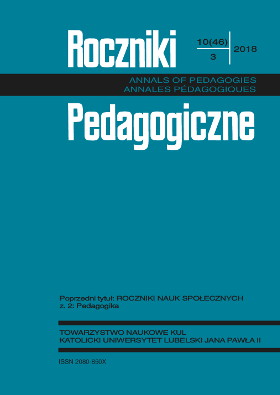Wspólnota dzieci i młodzieży Ruchu Focolari miejscem kształtowania umiejętności pokonywania trudności
Children and Youth Community of the Focolare Movementas a Place Where the Abilities to Overcome Obstacles are Shaped
Author(s): Mariola Teresa KozubekSubject(s): Social Sciences, Education, School education, Educational Psychology
Published by: Towarzystwo Naukowe KUL & Katolicki Uniwersytet Lubelski Jana Pawła II
Keywords: education to overcoming obstacles; community; Focolare Movement; Chiara Lubich
Summary/Abstract: The psychological condition of young generations is getting poorer and poorer, which can be observed especially in difficult and conflict situations that require independent actions. This is a considerable challenge faced by teachers and educators. Looking at a range of programs involving measures aimed at preventing developmental disorders in children and young people, in particular concerning the social and emotional sphere of their functioning, it is worthwhile paying attention to those dealing with formative activities undertaken as part of Christian children and youth communities founded at the turn of the 20th and 21st century. One of them is the Focolare Movement, established during the second world war by a young teacher Chiara Lubich (1920-2008). Experiencing the educational community of the Movement is a source of valuable material for analyses. This experience, along with selected texts and speeches of Lubich addressed at children and young people and analyzed from a hermeneutic perspective, constitute the basic source of the present analyses. What follows from them is that formative actions within the Movement are conducted based on a coherent program that supports an integral development of a person as well as the idea of living for others through the participation in the community. The assumptions accepted by the Movement pertaining to transcendence of the human being, interpersonal relations, and the attitude to the world allow for demonstrating to young people that any life obstacle may have a positive side to it. Although the source of these assumptions are religious charisma and experience, such formation performed by the communities is not restricted to the faith-related issues only (i.e. religious education) but includes all areas of life of young people. Seen from this angle, communities seem to be a place for shaping the abilities to overcome life difficulties. The educational ideas of Lubich are applied in diverse cultures around the world. Also, they have been recognized by significant scientific and religious circles, which can be demonstrated by the following distinctions: the Templeton Prize, the UNESCO Prize for Peace Education, the Human Rights Prize awarded by the Council of Europe, as well as 16 honorary doctorate degrees, including an honorary doctorate in education studies awarded by the American University in Washington (2000). The author’s considerations may serve as a basis for further analyses, especially given that the educational experience and pedagogical ideas of Lubich are relatively unknown in Poland.
Journal: Roczniki Pedagogiczne
- Issue Year: 10/2018
- Issue No: 3
- Page Range: 59-75
- Page Count: 17
- Language: Polish

